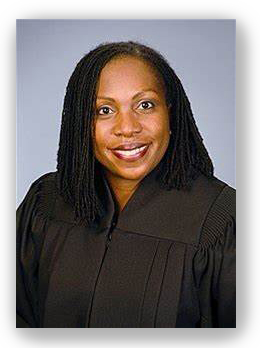We post news and comment on federal criminal justice issues, focused primarily on trial and post-conviction matters, legislative initiatives, and sentencing issues.

THE POLS WERE BUSY LAST WEEK (OR NOT)
 Rocket Woman: Only 15 years ago, Ketanji Brown Jackson was an assistant public defender in Washington, DC. Six years later, she was a federal judge. Ten months ago, she was confirmed as a judge on the US Court of Appeals for the D.C. Circuit. Last week, her dizzying ride through the judiciary continued as President Joe Biden nominated her to take retiring Justice Stephen Breyer’s spot on the Supreme Court.
Rocket Woman: Only 15 years ago, Ketanji Brown Jackson was an assistant public defender in Washington, DC. Six years later, she was a federal judge. Ten months ago, she was confirmed as a judge on the US Court of Appeals for the D.C. Circuit. Last week, her dizzying ride through the judiciary continued as President Joe Biden nominated her to take retiring Justice Stephen Breyer’s spot on the Supreme Court.
Picking Judge Jackson fulfills Biden’s promise to appoint a black woman to the high court. But she’s no token: Harvard Law (editor of the Harvard Law Review), a law clerk for Justice Breyer (whom she will replace), an attorney (and later vice-chair) at the U.S. Sentencing Commission, a public defender with one uncle who was a big-city police chief and another who was doing life on a federal drug charge (until he got clemency from Obama). Jackson would be the only Supreme Court justice with extensive Guidelines experience and the only one who ever did federal criminal defense work
There will be the usual bickering in the Senate leading up to her confirmation, but she’ll get confirmed: Sen. Charles Grassley (R-Iowa), the ranking minority member of the Senate Judiciary Committee expressed enthusiasm about Judge Jackson’s support for the First Step Act during last spring’s hearing on her appointment to the Court of Appeals (although he didn’t vote to confirm). But three other Republicans did. All it takes is 51 votes in the Senate: the Democrats will provide 50, and Kamala Harris will break the tie if a Republican does not defect. At least one will.
The appointment is good news for federal inmates. Judge Jackson is reliably liberal, and she knows federal criminal law. As a Sentencing Commission member in 2011, she was passionate about equalizing the sentences for crack and powder. The Wall Street Journal said yesterday, “Supreme Court nominee Ketanji Brown Jackson would, if confirmed, be the first justice in decades to have worked as a lawyer representing poor criminal defendants, a background that could add a new perspective to the high court’s deliberations.”
That makes her the equal (if not superior) to any of the other eight Justices.
More Demands for BOP Accountability: As I noted last week, the drums on Capitol Hill continue to sound for the BOP. Senate Judiciary Committee chairman Sen Richards Durbin (D-Ill), Sen Grassley, and California Sens Dianne Feinstein and Alex Padilla (both D) sent a letter to Attorney General Merrick Garland and Deputy Attorney General Lisa Monaco demanding the Justice Department turn over a pile of information about employee misconduct and procedures in place to stem sexual abuse.
Associated Press reported that the letter “is the latest illustration of increasing scrutiny of the scandal-plagued bureau following the AP’s reporting. Last week, the Senate launched a bipartisan working group to focus on the federal prison system, and lawmakers have been introducing legislation to increase oversight of the nation’s 122 federal prisons.”
In a case of bad timing, the letter was sent to the AG the same day James T. Highhouse, the former chaplain at FCI Dublin, pled guilty in San Francisco federal court to five felonies relating to his work at the FCI-Dublin female prison in the Northern District of California. Highhouse admitted he sexually abused a Dublin inmate multiple times and then lied to the FBI about it.
 In a separate report, the AP said “whistleblower” employees of the BOP say high-ranking prison officials are bullying them for exposing wrongdoing and threatening to close FCI Dublin if workers keep reporting abuse, even as members of Congress say they’re being stonewalled in efforts to pry information from what AP calls “the beleaguered bureau.”
In a separate report, the AP said “whistleblower” employees of the BOP say high-ranking prison officials are bullying them for exposing wrongdoing and threatening to close FCI Dublin if workers keep reporting abuse, even as members of Congress say they’re being stonewalled in efforts to pry information from what AP calls “the beleaguered bureau.”
AP reported, “The Bureau of Prisons’ proclivity for silence and secrecy has endured, workers and lawmakers say, even after an Associated Press investigation revealed years of sexual misconduct at the women’s prison — the federal correctional institution in Dublin, California — and detailed a toxic culture that enabled it to continue for years.”
EQUAL Act: Thursday, leading New York civil rights and criminal justice organizations sent a letter to Senate Majority Leader Chuck Schumer (D-NY) pushing him to bring the EQUAL Act (S.79) to a vote within the next month.
 The EQUAL Act will “finally and fully eliminate the racially unjust federal sentencing disparity between crack and powder cocaine offenses, one of the worst vestiges of the failed War on Drugs,” Black Starr reported. In September, EQUAL passed in the House by a 361-66 vote, supported by everyone from the Freedom Caucus on the right to the Progressive Caucus on the left. In the Senate, where the legislation was introduced by Senator Cory Booker (D-NJ), EQUAL currently has seven Republican and five Democrat cosponsors.
The EQUAL Act will “finally and fully eliminate the racially unjust federal sentencing disparity between crack and powder cocaine offenses, one of the worst vestiges of the failed War on Drugs,” Black Starr reported. In September, EQUAL passed in the House by a 361-66 vote, supported by everyone from the Freedom Caucus on the right to the Progressive Caucus on the left. In the Senate, where the legislation was introduced by Senator Cory Booker (D-NJ), EQUAL currently has seven Republican and five Democrat cosponsors.
Up in Smoke: The Wall Street Journal reported last Tuesday that because of the “tough midterm election and divisions in Congress, the Biden administration is sidestepping the politically sensitive issue of loosening marijuana laws, even as the idea has gained broad public support.
“More than half of U.S. states have legalized cannabis use for some purposes,” the Journal said. “Lawmakers have proposed decriminalizing marijuana… Those promoting changes include a diverse range of political figures… If someone like myself and a progressive like Alexandria Ocasio-Cortez can find some common ground, it begs the question, why hasn’t the president acted?” Rep Dave Joyce (R-Ohio), told the Journal. Joyce, who has worked on decriminalization of pot, said, “The solutions are there. It’s just a matter of political will.”
 The problem isn’t political will, it’s political ‘won’t’.” Major legislation to decriminalize cannabis is stuck “amid opposition from some Republicans and some moderate Democrats. President Biden hasn’t acted on his own campaign-trail promises to decriminalize marijuana and expunge criminal records of users. The White House said cannabis policy is under study, but declined to comment further.”
The problem isn’t political will, it’s political ‘won’t’.” Major legislation to decriminalize cannabis is stuck “amid opposition from some Republicans and some moderate Democrats. President Biden hasn’t acted on his own campaign-trail promises to decriminalize marijuana and expunge criminal records of users. The White House said cannabis policy is under study, but declined to comment further.”
The MORE Act of 2021 (H.R. 3617) passed the House in September, but seems dead in the Senate.
More than two in three Americans support legalizing marijuana, according to a 2021 Gallup poll, up from one-half a decade ago. Still, as The Skimm reported last week, “while Americans largely want to legalize weed, it’s not a top priority for them either. Forty-three percent of US adults also reportedly have access to rec weed. So, the urgency to get the federal gov involved may not be very high.” What’s worse, The Skimm said, Biden has remained blunt about marijuana: “He doesn’t believe in legalizing it… Biden said he wants more research on marijuana’s effects before changing his stance. But he has previously supported decriminalizing weed (a hot take for someone who helped spearhead the country’s war on drugs).”
New York Times, Biden Picks Ketanji Brown Jackson for Supreme Court (February 25, 2022)
SCOTUSBlog.com, In historic first, Biden nominates Ketanji Brown Jackson to Supreme Court (February 25, 2022)
Wall Street Journal, Judge Ketanji Brown Jackson Would Bring Rare Criminal-Defense Experience to Supreme Court (February 27, 2022)
Associated Press, Senators push Garland to reform prisons after AP reporting (February 23, 2022)
The Hill, Former federal prisons chaplain pleads guilty to sexually abusing inmate (February 2, 2022)
Associated Press, Whistleblowers say they’re bullied for exposing prison abuse (February 23, 2022)
Black Starr News, Schumer Pressed To Pass Bill Addressing Crack\Cocaine Sentencing Disparity (February 25, 2022)
S.79, EQUAL Act
Wall Street Journal, Push to Relax Marijuana Laws Hits Roadblocks (February 22, 2022)
MORE Act of 2021, H.R. 3617
The Skimm, Breaking Down the Buzz: Why the US Isn’t Puff, Puff, Passing Marijuana Legalization (February 23, 2022)
– Thomas L. Root

